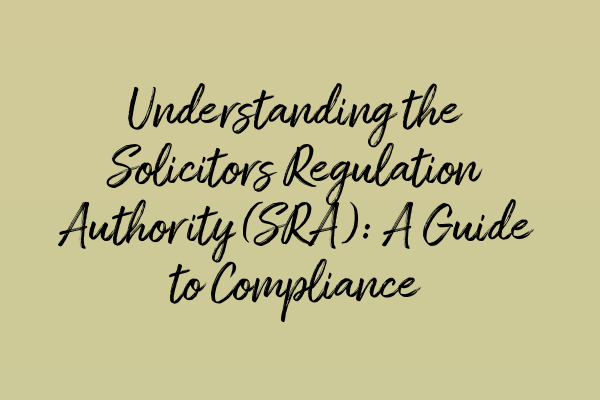Understanding the Solicitors Regulation Authority (SRA): A Guide to Compliance
Introduction
The legal profession is built on a foundation of trust, integrity, and professionalism. As solicitors, we are bound by a set of rules and regulations that ensure ethical and responsible practice. One of the key regulatory bodies overseeing solicitors in the UK is the Solicitors Regulation Authority (SRA). In this comprehensive guide, we will take a closer look at the SRA and provide you with a clear understanding of its role, responsibilities, and the compliance requirements for solicitors. So let’s dive in!
What is the Solicitors Regulation Authority?
The Solicitors Regulation Authority (SRA) is an independent regulatory body that governs solicitors in England and Wales. It operates under the Legal Services Act 2007 and is responsible for setting the standards of conduct and practice for solicitors, as well as regulating their professional activities. The SRA’s main objective is to protect the interests of the public, maintain public trust in the legal profession, and uphold the rule of law.
Key Responsibilities of the SRA
To achieve its objectives, the SRA carries out a range of functions and responsibilities. Some of the key areas the SRA focuses on include:
1. Setting and enforcing standards: The SRA establishes and maintains the Standards and Regulations that solicitors must adhere to. These standards cover various aspects of professional practice, client care, and ethical conduct.
2. Authorizing and supervising solicitors: The SRA is responsible for granting practicing certificates to solicitors, enabling them to provide legal services. It also monitors and oversees their activities to ensure compliance with the regulatory requirements.
3. Handling complaints and disciplinary proceedings: The SRA investigates complaints against solicitors and takes appropriate disciplinary action when necessary. This ensures that solicitors are held accountable for any misconduct or breaches of professional standards.
4. Promoting equality, diversity, and inclusion: The SRA actively promotes equality, diversity, and inclusion within the legal profession. It sets policies and initiatives to ensure equal opportunities for solicitors and eliminate discrimination.
5. Protecting client money and assets: The SRA regulates how solicitors handle client money and assets to protect the interests of clients. Solicitors are required to follow strict accounting rules and maintain proper records to prevent any misappropriation or mishandling of client funds.
Compliance Requirements for Solicitors
As solicitors, it is crucial to understand and comply with the SRA’s regulatory framework. Failure to meet these compliance requirements can have serious consequences, including professional misconduct charges, loss of reputation, and even suspension or removal from the solicitor’s register. Here are some of the key compliance areas to be aware of:
1. Code of Conduct: The SRA’s Code of Conduct sets out the fundamental ethical principles and professional standards that solicitors must adhere to. It covers areas such as integrity, confidentiality, competence, and client care. Familiarize yourself with the Code of Conduct and ensure your practice aligns with its principles.
2. Professional Indemnity Insurance: Solicitors must have adequate professional indemnity insurance (PII) in place to protect their clients and themselves. The SRA sets minimum insurance requirements that solicitors must meet.
3. Money Laundering Regulations: Solicitors play a crucial role in preventing money laundering and terrorist financing. As such, solicitors are required to comply with the Money Laundering Regulations, which include implementing robust client due diligence procedures and reporting suspicious transactions to the relevant authorities.
4. Continuing Professional Development (CPD): To maintain professional competence, solicitors must engage in ongoing learning and development. The SRA requires solicitors to undertake a minimum number of CPD hours each year to stay up to date with legal developments and enhance their skills.
5. Cybersecurity and Data Protection: In today’s digital age, solicitors must be vigilant in protecting client data and safeguarding against cyber threats. The SRA provides guidance on data protection and cybersecurity measures that solicitors should implement.
Conclusion
Compliance with the Solicitors Regulation Authority (SRA) is of utmost importance for solicitors. By adhering to the SRA’s regulatory framework and meeting the compliance requirements, solicitors can ensure ethical and responsible practice, protect the interests of their clients, and maintain public trust in the legal profession.
Remember, understanding the SRA and its compliance requirements is just the beginning. To excel in your legal practice, it is essential to continuously develop your skills and knowledge in specific areas of law. For more insights and guidance on property practice, lease extensions, property transactions, lease laws, and joint ownership, we recommend checking out the following related articles:
– Property Practice in the UK: Essential Skills and Knowledge for Success
– Lease Extensions and Enfranchisement: Navigating Complex Legal Procedures
– Property Transactions and the Legal Process: Navigate with Confidence
– Demystifying Lease Laws in the UK: Legal Frameworks Explained
– Mastering Joint Ownership: Legal Considerations for Co-Owners
Stay informed, stay compliant, and continue to grow as a solicitor in the dynamic legal landscape of England and Wales.


Leave a Reply